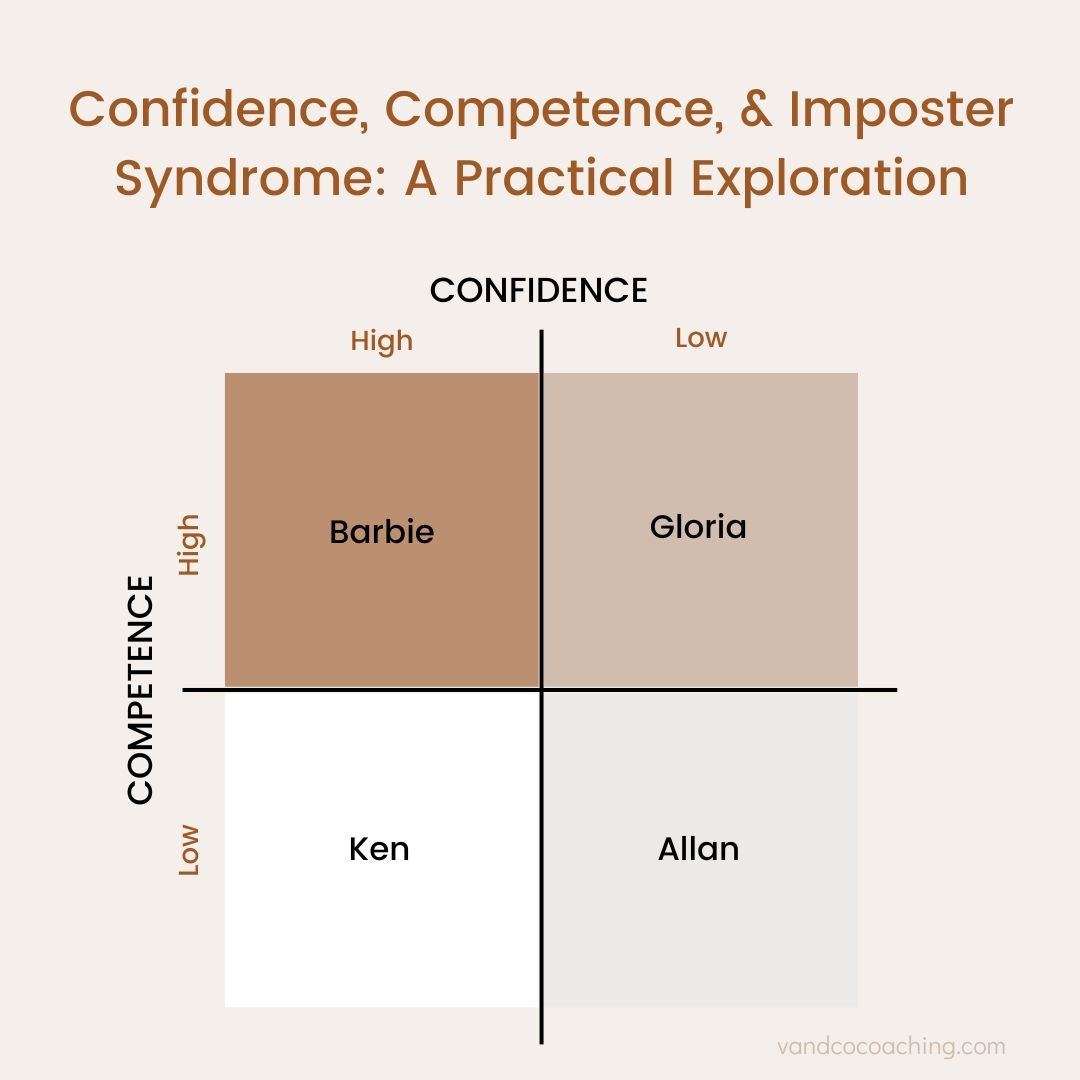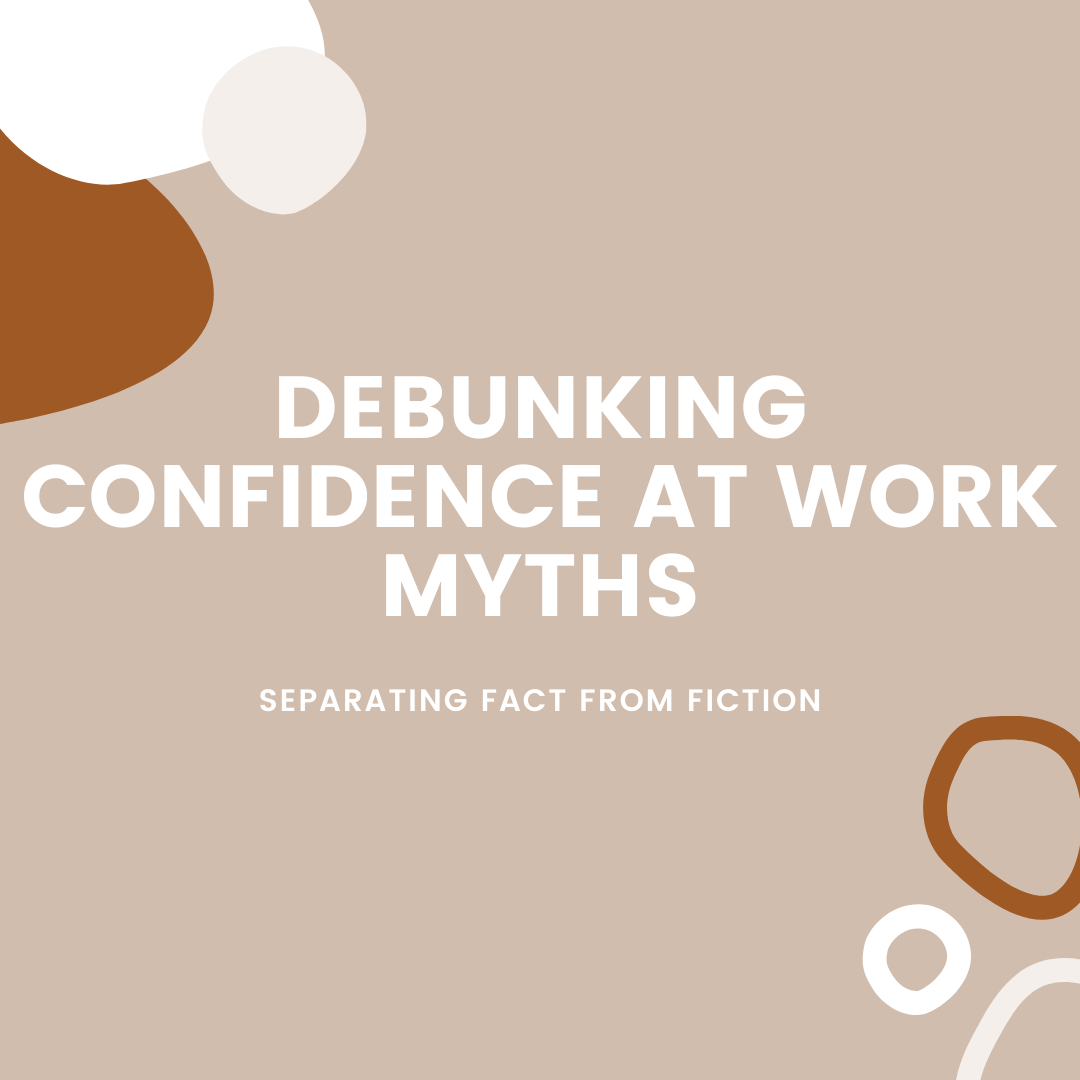Confidence, Competence, and Imposter Syndrome: A Practical Exploration
Today I am sharing about confidence. We can prepare our little hearts out for something, but if the weight of our belief is not behind it, it can misfire. Sometimes we can be so caught up in the idea we have to be good – competent – at something, we miss the benefits of just owning it.
Belief systems can be changeable (with some practice, anyway) and I suggest it’s worth considering the benefits of owning your work, even if you’re not entirely convinced of its competence. Bonkers? Maybe. Below I lay out the practical perspective of why simply owning your sh*t is worth it, and you can decide for yourself. Let’s get into it.
When Competence Overshadows Confidence
In a recent session, my client Grace was grappling with the growing pains of being recently promoted and entrusted with increasing responsibility and leadership. Grace worked hard to reach this point. She demonstrated competence on numerous projects as a junior and showed leadership capacity. However, despite the clear indication of her abilities, she is feeling less confident in her leadership role. She sits at a table with people she used to report to, and now they want her opinion on decisions.
She asked, “How do I add anything to the conversation? I’m not an expert. And I feel like I need to know more before I speak up in these meetings.” Grace is one of many of my clients struggling with the balance between competence and confidence. If we aren’t confident in our work, we won’t speak up.
The Concept – Closed Mouths Don’t Get Fed
My grandma was more the ‘children should be seen and not heard’ type, but I’ve heard of other elders who live by the ‘closed mouths don’t get fed’ principle. It’s another way of saying speak up, or you’ll miss out on something you need.
It’s not so dissimilar from what I explore with competence and confidence. There are opportunity costs to not promoting your work, such as missed leadership and growth opportunities. At the same time, too much confidence and not enough competence can lead to not being perceived as trustworthy. We are left striking a balance between the two. I explore the intersections of competence and confidence, namely whether we need one for the other and how different thought processes can help us gain confidence in our likely competence.
Four Quadrants of Confidence vs. Competence
Oftentimes we think we need expertise to be confident in a subject matter, but in reality, this is not the case. Our confidence is not reliant on our competence, rather the two can intersect at various levels. Let’s review the pros and cons of each. For fun, I liken the mentalities of these quadrants to the characters in the Barbie Movie.
Quadrant 1: High Confidence + High Competence (Barbie)
You are fully confident in your capabilities, can communicate this and take the lead. You are the boss and you know it, plus you have the abilities to back it up. You are so on fire that you occasionally forget it’s important to leave room for other opinions and ideas, because you think your way is best.
Mentality: Barbie
Pros: Effective leadership, successful outcomes
Cons: Potential for arrogance, lack of openness to new ideas
Quadrant 2: Low Confidence + High Competence (Gloria)
You know the subject matter but you don’t have the guts to put yourself out there. Perhaps you’re worried you don’t actually know all that’s expected or you do and don’t want to come off as a show-off or bossy.
Mentality: Gloria (America Ferrera's character)
Pros: Humility, openness to learning.
Cons: Others miss out on our expertise, missed leadership opportunities, can be perceived as less competent than you are
Quadrant 3: High Confidence + Low Competence (Ken)
You haven’t fully read the memo but that isn’t going to stop you from adding your two cents. You know that sometimes it's more about how you say something than what you say. Who needs to read and research when you have the confidence to BS your way through it?
Mentality: Ken
Pros: Boldness, risk-taking, demonstrates leadership
Cons: Potential for mistakes, can lead to being perceived as untrustworthy
Quadrant 4: Low Confidence + Low Competency (Allan)
You didn’t have time to prepare or you’re new to the concepts so you will keep your mouth shut and listen. You know you don’t know everything and you don’t think it's in your best interest to wing it.
Mentality: Allan (Michael Cera's character)
Pros: Willingness to learn, openness to feedback
Cons: Paralysis, missed growth opportunities
Pick Your Poison
All quadrants have their pros and cons. We aim for Barbie: High Confidence + High Competence, but what if we’re not quite there yet? Let’s consider the impact of choosing between Gloria: Low Confidence + High Competence, and Ken: High Competence and Low Confidence.
Competence: Understanding Perception vs. Reality
Even when people are competent they get stuck in Gloria: Quadrant 2 with low confidence. Why is that? Well, people could be suffering from the opposite of the Dunning-Krueger Effect which suggests people with limited competence in a specific area overestimate their abilities. An example of this is when Serena Williams proved deliciously wrong the 12% of the male population who thought they could score on her.
The opposite effect goes for high performers - they often tend to underestimate their skills. My client Grace, a high performer who underestimates herself exemplifies this. For instance, a study on Imposter Syndrome in medical students states that “students’ internalization of achievement and feelings of IP (imposter phenomenon) were not consistently aligned with their actual performance.“
This mindset could be linked to a more evolutionary phenomenon; our brains tend to emphasize the negative and focus on what needs to be fixed as a survival tactic. We are so busy worrying about what we don’t know we disregard all the things we do know. Cue imposter syndrome. The feeling of imposter syndrome may never go away despite all our accolades. Pushing through it is a matter of pushing through your perceptions and striving to reach your goals anyway. Remember, just because we think something does not make it a reality.
Confidence: The ‘Strong and Wrong’ Advantage
Bill Clinton said that Americans often lean towards favoring those who are "strong and wrong" over those who might be perceived as "weak and right." Take a moment to reflect on your own professional journey and consider this perspective. Undoubtedly, there are instances where assertiveness and confidence, even if misguided, seem to carry more weight than a nuanced but uncertain approach. Strength is a societal value, and if we acknowledge this reality and align with it, there could be value to ourselves and our careers.
Owning Your (Possible) Incompetence - Tips and Tricks
My question for Grace was what do you have to lose? What if indeed we aren’t the best judges of our own competence? There is an advantage to Strong and Wrong. It is better to own what you do know and take chances than let it cripple you into silence. How do we do that?
Recognize Thinking Traps and solve for them.Our mind can and does play tricks on us, but we don’t have to be fooled.
Self Compassion. Recognize the middle ground between not knowing and being curious with the intention to develop new skills. Your colleagues will likely have compassion for you, so extend some to yourself, too.
Balanced Confidence. Write your strengths down. Recall evidence of good work. Consider areas of improvement as opportunities for growth.
Restructure Unhelpful Thoughts. Journal on situations where you stay quiet or minimize your abilities. What’s going on in your head? What are you worried about? Is what you’re worried about really true? What’s the worst that can happen? What’s the best that could happen?
Trust and Believe in Your Power
“I still have a little imposter syndrome… It doesn’t go away, that feeling that you shouldn’t take me that seriously. What do I know? I share that with you because we all have doubts in our abilities, about our power and what that power is.” - Michelle Obama
We all have doubts. In fact, 70% of people are likely to experience imposter syndrome. You could be the First Lady of the United States and still suffer from some insecurities in your abilities. Recognize that competence does not equal competence and vice versa — and that we’re often not the best judge of our competence anyway. Recognize the power, and even fun, in owning what you know and the societal benefit to doing so even if you're not so sure.












